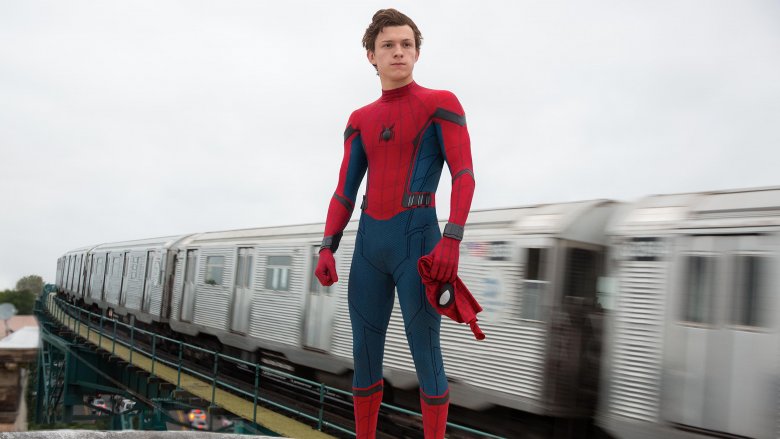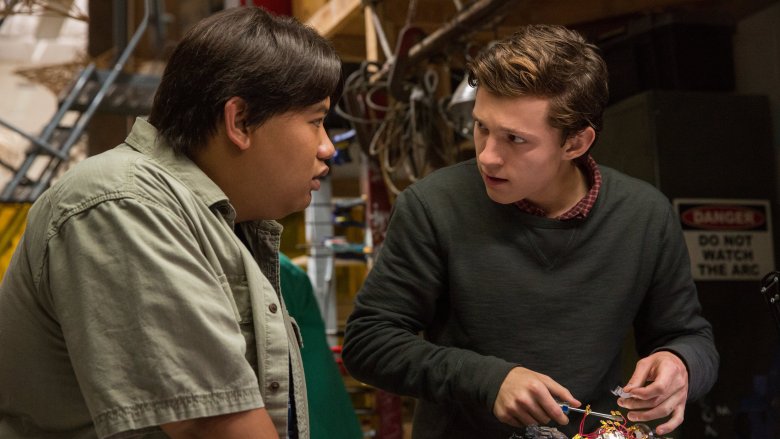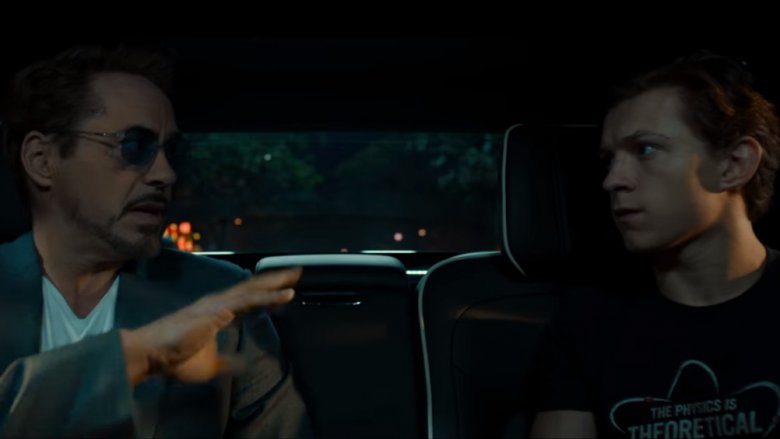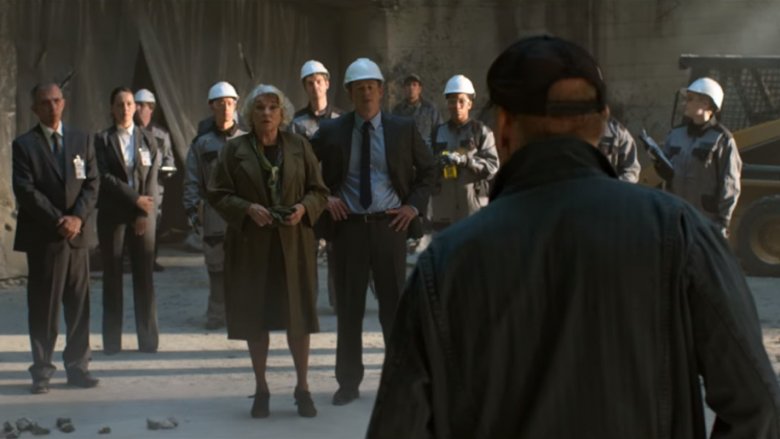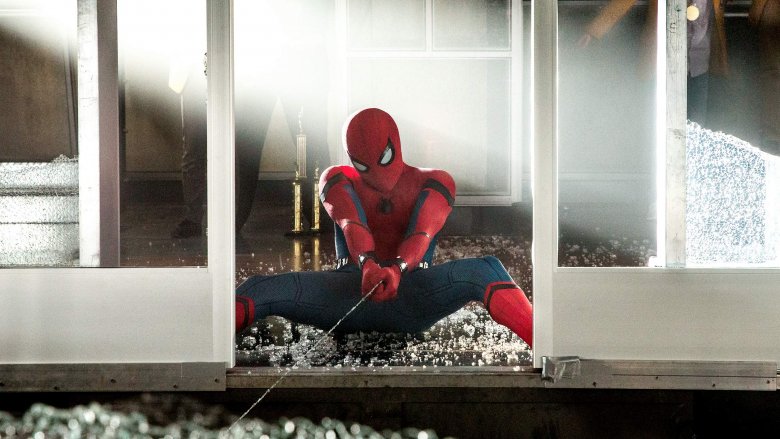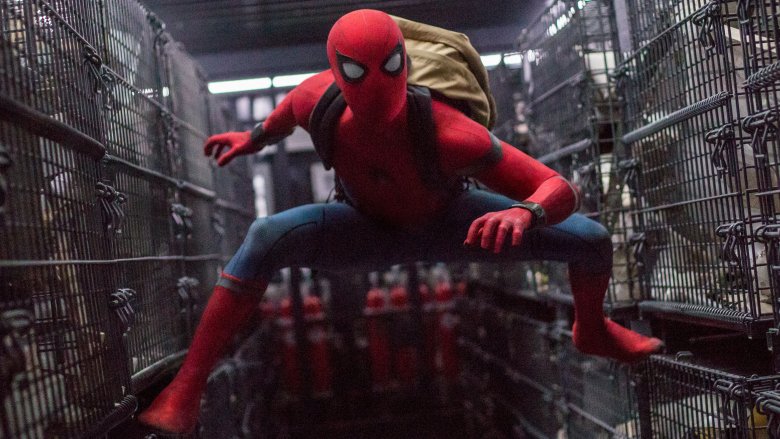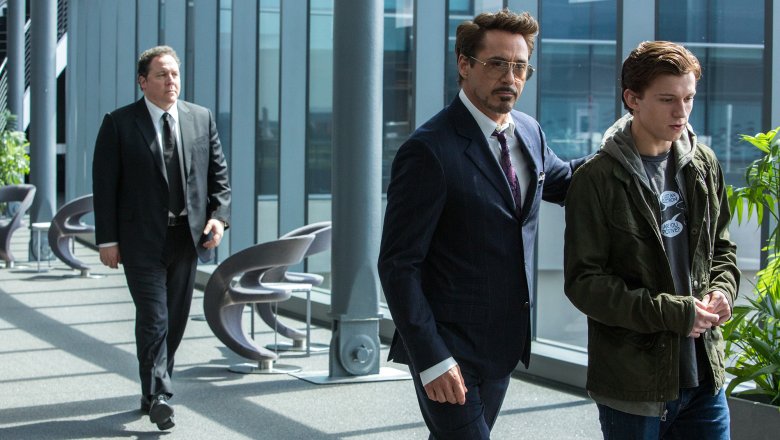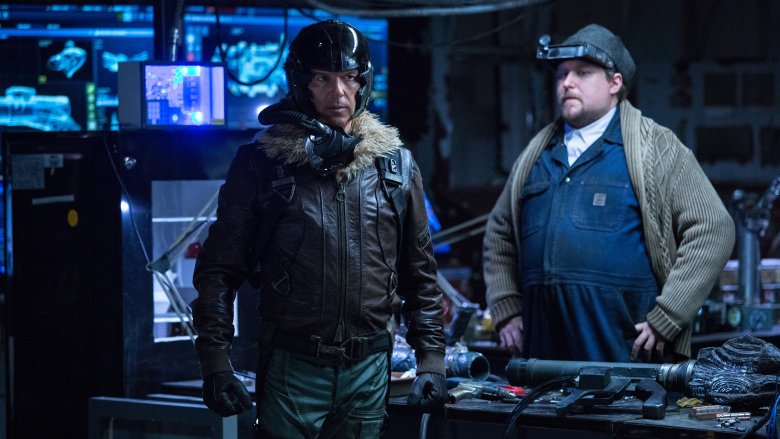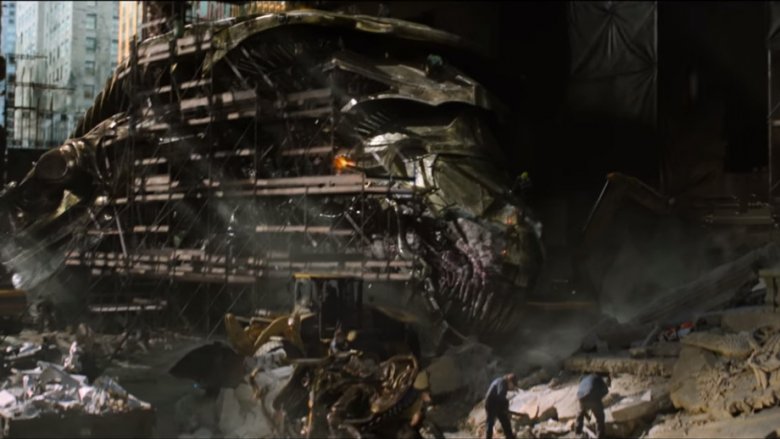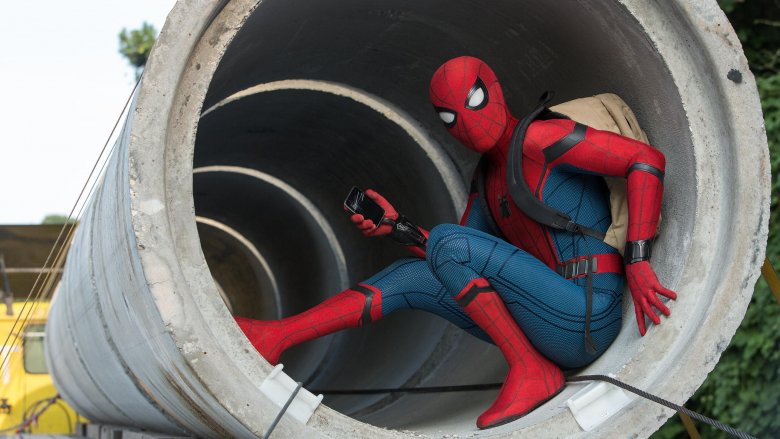Spider-Man: Homecoming Details Only Adults Notice
There's a reason Spider-Man has been played by three different actors in three different franchises in less than two decades, and remains the flagship character of Marvel Comics. A Spider-Man movie can reach just about every demographic if it's done right, and Spider-Man: Homecoming captured that appeal all over again.
As the first Spidey solo entry in the Marvel Cinematic Universe, it drew in the longstanding fans who've been with that world for a decade, but it was also the kind of film that teenagers and even younger children could flock to and enjoy. Some of that's because Peter Parker is a teenager, but a lot of is just thanks to the tremendous appeal of the down-on-his-luck superhero who just keeps trying anyway. That means when you went to see Homecoming, you were rubbing elbows with fans of all ages, and that means some younger viewers definitely walked away missing a few things that you're still rolling over in your head. In that spirit, here are a few things from Spider-Man: Homecoming that kids might have missed, but adults definitely picked up on.
Peter Parker's messed up life
Spider-Man: Homecoming took one very wise step — it's the first Spider-Man franchise launch that bypasses the character's tragic origin story and just goes right to the superhero action. When we meet Peter Parker (Tom Holland), he's been Spider-Man for six months, and he's living alone with his Aunt May (Marisa Tomei) as if that's a normal arrangement that's been part of his life for some time.
The only real references to what came before are heard in a single conversation with his best friend Ned (Jacob Batalon), in which we learn that he was bitten by a spider and that's how he got his abilities. This, coupled with his living situation, allows fans to draw their own conclusion that this Peter has the same classic origin story, but it's not being talked about. That means, presumably, that Peter got his Spider-Man powers and then, through his selfish inaction, failed to prevent the death of his uncle, which is referenced when he talks about "all that [May]'s been through" in his chat with Ned. So, Peter Parker has, possibly within the last year, been through some very tragic stuff, but no one ever brings it up, even when he appears to be having trouble at school that could be explained by it. That's a bit odd even without an origin story.
The MCU timeline is a bit murky
Spider-Man: Homecoming opens in the immediate aftermath of the Battle of New York, which took place during The Avengers, a film that came out in 2012. The intent here is to establish the massive cleanup efforts that have begun to emerge behind every major superhero incident, and to drop a subtle tease that the Vulture (Michael Keaton) is a parent, but then the film offers something that very few other Marvel Cinematic Universe movies ever have: A title card reading "8 Years Later."
In the context of the film, it's not that weird, but if you look at the larger picture of the MCU, it gets a little puzzling. The Avengers was a five-year-old movie at the time Homecoming hit theaters, and if you extrapolate out from its release date and assume the films are happening in real time, that would mean Homecoming takes place in 2020, which seems silly. So what gives? Well, according to MCU producer Kevin Feige, that title card is exactly why Marvel rarely provides concrete dates for anything in their films. We aren't meant to assume that The Avengers takes place four years after Iron Man, or that Avengers: Infinity War takes place six years after The Avengers. It might be confusing, but just roll with it. Apparently an official timeline will arrive...someday.
Where was Damage Control this whole time?
That opening sequence featuring Vulture and his crew just after the Battle of New York also adds another wrinkle to the MCU, one that feels like perhaps it should have been addressed sooner. Vulture, real name Adrian Toomes, is a private contractor hired by New York City to help clean up all the debris left over from the battle, but he's quickly sent home by a group of Feds who show up and take over his job site. A TV screen in the next scene reveals that this is the Department of Damage Control, a new federal agency created to assist in the cleanup that comes after superhero battles.
Throughout the film we see Damage Control's influence in everything from the warehouse Peter gets locked in to the various weapons Phineas Mason (Michael Chernus) manufactures in Vulture's lair, and it's clear they've cleaned up everything from the Chitauri invasion to the Ultron robots that overran Sokovia. That a department exists specifically to clean up after the Avengers makes sense, but what makes less sense is why we haven't heard anything about them before. Sure, it's just a simple omission because they aren't really necessary to the story (they're the guys who come in after the story), but still. You'd think that perhaps they'd have been mentioned during the arguments over superhero accountability during Captain America: Civil War, just to give everyone an idea of how bad the damage often is.
Spider-Man's physiology is weirdly selective
This isn't so much something you notice in Homecoming as it is something you notice in all Spider-Man media, but it's still something adults often can't stop thinking about while various younger audience members might just breeze right by. The story goes that Peter Parker was written by a radioactive (or genetically enhanced, or both) spider, and this triggered a transformation that granted him various spider-like abilities.
Conveniently, though, Peter only really got the stuff that would be useful for a human — enhanced proportional strength, speed, and the ability to climb walls — while the more spider-y stuff didn't transfer. Peter makes his own "web fluid" rather than making organic webs (as Tobey Maguire's version of the character did in 2002), which is convenient because if he'd actually been given those natural abilities the webs would quite possibly come from...well, not from his hands. Peter just accepts this by the time we meet him, but other characters like Ned aren't sure how it works. When Ned asks "Do you lay eggs?" Peter laughs him off, even though it's kind of a reasonable question when you find out someone just got spider powers one day and didn't tell anyone.
The Spider-suit seems really eager to kill people
In Captain America: Civil War, Peter is given a brand-new Spider-suit personally designed by Tony Stark/Iron Man, and in Homecoming, both Peter and the audience get to know the suit and its features a little more. It's revealed that the basic mode in which Peter's been operating is called "the training wheels protocol," but midway through the film, Ned hacks the suit and disables that, so Peter suddenly has access to all the features, including hundreds of different web combinations and an artificial intelligence he names "Karen."
In many instances, this proves to be quite useful, as Karen can educate him about the suit and provide things like navigation during the Washington D.C.-based sequences. Then it gets a little darker when she asks Peter if he'd like to try "Enhanced Combat Mode." When he says yes, she immediately switches the suit to "Instant Kill," and while we don't get to see what that mode does, we do know it turns the suit's eyes a menacing red. Peter immediately turns the mode off, but Karen brings it up at least on other time during the film. Now, superheroism is dangerous business, and sometimes that means putting an enemy down, but why would Tony Stark give something called "instant kill" to a teenage boy he's specifically trying to keep out of trouble? Sure, it's behind a training wheels safeguard, but still. It was so easy to access.
Iron Man is kind of a jerk to Peter
Over the course of their MCU relationship, Tony Stark and Peter Parker have developed a relationship that's at the very least mentor/mentee and at its most emotional verges on father/son. But even with that in mind, Tony's not exactly at his best when he interacts with Peter throughout Homecoming.
First he drafted Peter into his Civil War fight because he needed more people on his team, gave the kid a brand new suit, and then dropped him back in Queens without telling him when he'd get to see the other heroes again. Then, when Peter stumbled upon Vulture and his dangerous weapons deals, he tried to intervene only to be pushed away by Iron Man. Tony eventually called the FBI on Vulture, but didn't bother to tell Peter, then got mad when Peter kept trying to stop Vulture and took the Spider-suit back. It's only after Peter stops Vulture on his own, with his old suit, that Tony realizes he was wrong to underestimate Peter and invites him to join the Avengers, but that's after weeks of either ignoring him or chastising him for trying to protect his neighborhood. Sure, Tony means well, but he could have been a little more delicate with the way handled the teenager with superheroic aspirations.
Vulture kind of has a point
The MCU has often been criticized for one-dimensional, unrelatable villains, but along with Killmonger in Black Panther, Homecoming's Vulture has become one of the characters who broke that trend. Adrian Toomes' journey to villainy doesn't begin with godlike powers or a horrifying accident that grants him strange abilities. Instead, he starts off as a regular guying doing a regular job — salvage after a disaster — who finds one day that all of his time and money was for nothing, because a Tony Stark-supported government agency is taking it all over.
Sure, it takes a certain amount of moral flexibility to turn from that betrayal to a life of selling weapons that can disintegrate a human being with one shot, but it all starts with a man who worked hard for what he had, only to have it stripped away in a second. So he finds another way to do business, and he tries to explain to Peter that he did it because he was tired of the rich and powerful taking advantage of him. It's a twisted view — by the end of the film he's driving a Bentley around Queens, so he's not exactly middle class anymore — but you can at the very least see how things started to take a turn.
There's a lot of dangerous stuff just floating around the MCU
Speaking of Vulture's turn to a life of crime, he couldn't have done it if he didn't have access to all the little parts and scraps left over from various superhero dust-ups in the intervening eight years. Sure, there's a government department specifically tasked with cleaning up after the Avengers, but things are clearly falling through the cracks quite a bit.
Vulture steals what he needs to supply his weapons business, but he's been at it a long time, and business has been good enough that he's driving a Bentley and living in a gorgeous house, so what does that say about just how many weapons he's sold over the years? Plus, if he's able to get away with it for so long, how do we know other people aren't doing similar things simply because they picked something up off the street in New York? The point is, there are guns made out of Ultron arms sitting in closets and under beds across America by the time Homecoming rolls around, whether the film shows them to us or not.
Where does Peter Parker fit in the Sokovia Accords?
Spider-Man makes his debut in the world of superheroes at large during the events of Captain America: Civil War, a conflict fought in part over the Sokovia Accords designed to put superhero groups like the Avengers in check, giving them some kind of government oversight in an effort to limit collateral damage and loss of life. Captain America and his crew oppose the U.N.-backed Accords, while Iron Man supports them, and drafts Spider-Man to help him in the fight. Then Homecoming rolls around and...Peter's place in the world of superheroes is basically never addressed again. Sure, Iron Man is looking after him, and the ratification process was interrupted by a bomber, but surely the Accords weren't just glossed over, right?
Does that mean Peter Parker's real name and location is tucked away in a file somewhere, or did Stark just brush all that aside to protect Peter, despite supporting the Accords for himself? It's not clear and it's never brought up, even though that's how Tony and Peter connected in the first place. Granted, the MCU has bigger problems now...
